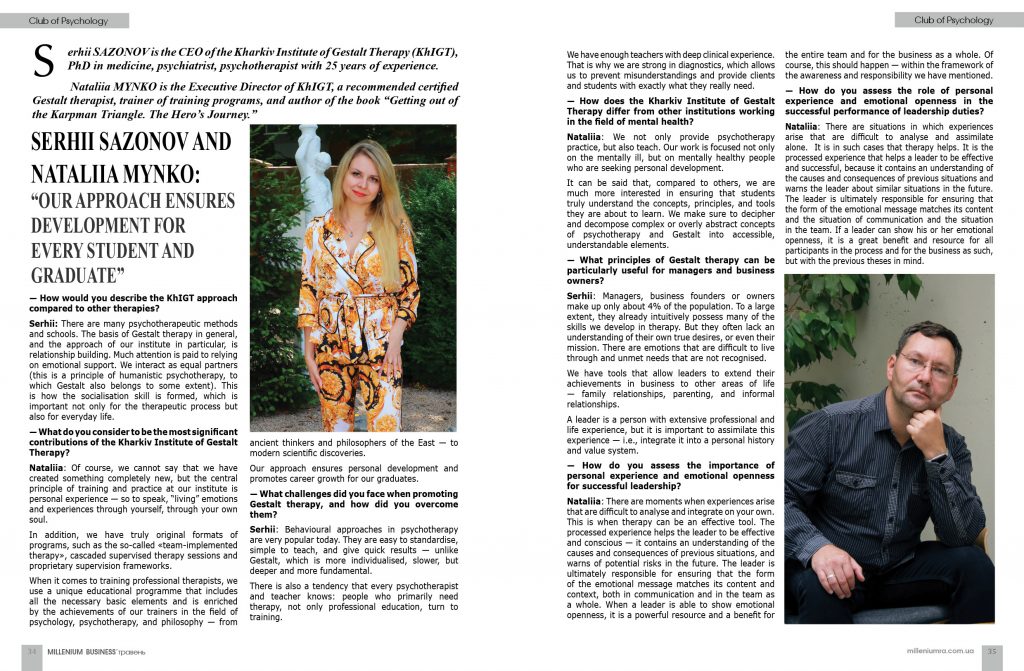Serhii SAZONOV is the CEO of the Kharkiv Institute of Gestalt Therapy (KhIGT), PhD in medicine, psychiatrist, psychotherapist with 25 years of experience.
Nataliia MYNKO is the Executive Director of KhIGT, a recommended certified Gestalt therapist, trainer of training programs, and author of the book “Getting out of the Karpman Triangle. The Hero’s Journey.”

— How would you describe the KhIGT approach compared to other therapies?
Serhii: There are many psychotherapeutic methods and schools. The basis of Gestalt therapy in general, and the approach of our institute in particular, is relationship building. Much attention is paid to relying on emotional support. We interact as equal partners (this is a principle of humanistic psychotherapy, to which Gestalt also belongs to some extent). This is how the socialisation skill is formed, which is important not only for the therapeutic process but also for everyday life.
— What do you consider to be the most significant contributions of the Kharkiv Institute of Gestalt Therapy?
Nataliia: Of course, we cannot say that we have created something completely new, but the central principle of training and practice at our institute is personal experience — so to speak, “living” emotions and experiences through yourself, through your own soul.
In addition, we have truly original formats of programs, such as the so-called «team-implemented therapy», cascaded supervised therapy sessions and proprietary supervision frameworks.
When it comes to training professional therapists, we use a unique educational programme that includes all the necessary basic elements and is enriched by the achievements of our trainers in the field of psychology, psychotherapy, and philosophy — from ancient thinkers and philosophers of the East — to modern scientific discoveries.
Our approach ensures personal development and promotes career growth for our graduates.
— What challenges did you face when promoting Gestalt therapy, and how did you overcome them?
Serhii: Behavioural approaches in psychotherapy are very popular today. They are easy to standardise, simple to teach, and give quick results — unlike Gestalt, which is more individualised, slower, but deeper and more fundamental.
There is also a tendency that every psychotherapist and teacher knows: people who primarily need therapy, not only professional education, turn to training.
We have enough teachers with deep clinical experience. That is why we are strong in diagnostics, which allows us to prevent misunderstandings and provide clients and students with exactly what they really need.
— How does the Kharkiv Institute of Gestalt Therapy differ from other institutions working in the field of mental health?
Nataliia: We not only provide psychotherapy practice, but also teach. Our work is focused not only on the mentally ill, but on mentally healthy people who are seeking personal development.
It can be said that, compared to others, we are much more interested in ensuring that students truly understand the concepts, principles, and tools they are about to learn. We make sure to decipher and decompose complex or overly abstract concepts of psychotherapy and Gestalt into accessible, understandable elements.
— What principles of Gestalt therapy can be particularly useful for managers and business owners?
Serhii: Managers, business founders or owners make up only about 4% of the population. To a large extent, they already intuitively possess many of the skills we develop in therapy. But they often lack an understanding of their own true desires, or even their mission. There are emotions that are difficult to live through and unmet needs that are not recognised.
We have tools that allow leaders to extend their achievements in business to other areas of life — family relationships, parenting, and informal relationships.
A leader is a person with extensive professional and life experience, but it is important to assimilate this experience — i.e., integrate it into a personal history and value system.
— How do you assess the importance of personal experience and emotional openness for successful leadership?
Nataliia: There are moments when experiences arise that are difficult to analyse and integrate on your own. This is when therapy can be an effective tool. The processed experience helps the leader to be effective and conscious — it contains an understanding of the causes and consequences of previous situations, and warns of potential risks in the future. The leader is ultimately responsible for ensuring that the form of the emotional message matches its content and context, both in communication and in the team as a whole. When a leader is able to show emotional openness, it is a powerful resource and a benefit for the entire team and for the business as a whole. Of course, this should happen — within the framework of the awareness and responsibility we have mentioned.
— How do you assess the role of personal experience and emotional openness in the successful performance of leadership duties?
Nataliia: There are situations in which experiences arise that are difficult to analyse and assimilate alone. It is in such cases that therapy helps. It is the processed experience that helps a leader to be effective and successful, because it contains an understanding of the causes and consequences of previous situations and warns the leader about similar situations in the future. The leader is ultimately responsible for ensuring that the form of the emotional message matches its content and the situation of communication and the situation in the team. If a leader can show his or her emotional openness, it is a great benefit and resource for all participants in the process and for the business as such, but with the previous theses in mind.
